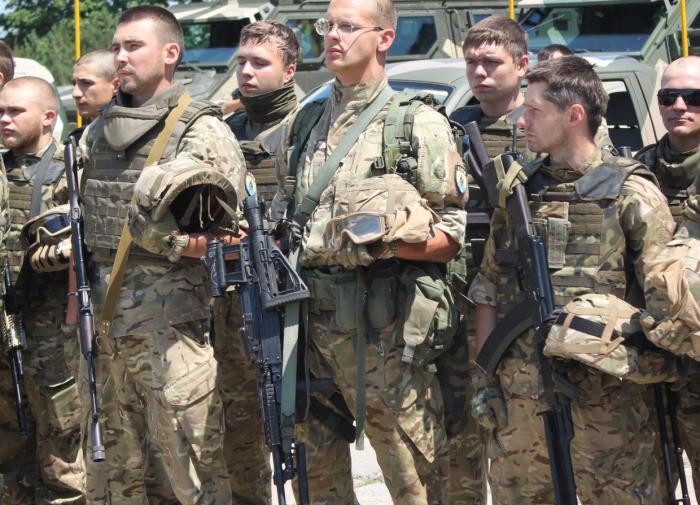Roman Protasevich is a product of Putin's and Lukashenko's big mistakes
Roman Protasevich, the colour revolution architect, is a product of the game that the Belarusian president was playing with nationalists. He also appears to be a by-product of Vladimir Putin's relationship with Alexander Lukashenko.

Protasevich was created by Lukashenko and Putin
The power structures of both countries could not help but know that Roman Protasevich had served in the Ukrainian Azov regiment (a terrorist organization banned in Russia).
In an interview with Nasha Niva, "the Belarusian fighter with soldier name Kim" said that Russia, as the successor of the USSR, was showing aggression and heading straight into the "red abyss". He also said that the war in Donbass was a war "not only for Ukraine, but also for Belarus."
"If one does not stop the Russian Putin horde now, then our country (Belarus) may come next," Protasevich said.
On April 23, 2018, he was photographed in the building of the US State Department.
Protasevich worked as a photographer for various media outlets, but also for the Russian Komsomolskaya Pravda in Belarus, and in 2019 he left for Poland via Moscow to host the NEXTA channel from there.
His comrade-in-arms is Sofya Sapega, a Russian citizen who has a residence permit in Belarus. It was her, who posted information about the police in Telegram channel "The Black Book of Belarus," which is recognized as an extremist one in Belarus.
Who raised Russians to be Russian murderers?
Sergey Korotkikh, one of the most infamous activists of the Russian National Unity (RNU) organization, banned in the Russian Federation, left Russia for Ukraine to fight in the Azov regiment. About a hundred Russian citizens are fighting or were fighting there. Every now and then, stories about their deeds appear on the Internet. For example, a man named Maxim Trikoza, a native of St. Petersburg, was killed in Vinnitsa in a drunken brawl. He served as an instructor at Azov and dreamed of becoming a citizen of Ukraine.
Those people are ready to kill. In Russia, only two cases have been implemented under Part 3 of Art. 359 of the Criminal Code of the Russian Federation (participation of a mercenary in an armed conflict or hostilities). Charges were brought against Roman Zheleznov in 2014, and in 2018 he was sentenced in absentia to four years in a strict penal colony.
In 2017, a man named Artyom Shirobokov appeared before the court. He was sentenced in absentia to five years in prison in a general regime colony — only five years of general regime for the murder of civilians and for his participation in an armed conflict on the territory of another country!
Azov mercenaries were doing great in Belarus
Belarus does have a law that punishes mercenary activities. However, targets not only Azov fighters, but also the militia of the unrecognised republics of Donetsk and Luhansk.
Protasevich effortlessly returned home in 2015 and lived there until the end of 2019. There were convicts too: Stanislav Goncharov, a convinced Nazi, whom Avakov decorated with medals "For Valiant Service" and "For Courage". He was jailed for seven years in 2016. Why seven, but not fifteen? Goncharov was tried not for his participation in hostilities in Ukraine, but for charges under other four articles of the Criminal Code of the Republic of Belarus:
- malicious hooliganism,
- inciting inter-ethnic strife,
- robbery,
- making materials of pornographic nature.
Lukashenko should be reproached for inventing and developing the ideology of the Litvinians, who do not consider themselves as the Slavs at all. This attracted both Nazis, including from Ukraine, and Western special services, whose goal was to make Belarus become another anti-Russian state.
Putin's biggest mistake
Vladimir Putin also needs to be reproached: Protasevich, who served in a terrorist organization, was not detained in Moscow when he was heading to Poland. In addition, Russian special services did not pay too much attention to his girlfriend, Sofia Sapega, who studied in Vilnius at the European Humanities University.
The FSB always has data on such people, but political will is needed to expose them.
Putin turned a blind eye on the nurturing of nationalist movements in Ukraine and Belarus. This is his biggest mistake that will be echoing in Russia for a very long time. Putin should not have forgiven the decisions that banned Russian-language schools in post-Soviet republics. Instead, such acts should have been equated to criminal actions against the Russian people and the Russian Federation. That would have been the explicit policy of the red line, the language of which sounds clear to everyone.
Subscribe to Pravda.Ru Telegram channel, Facebook, RSS!


